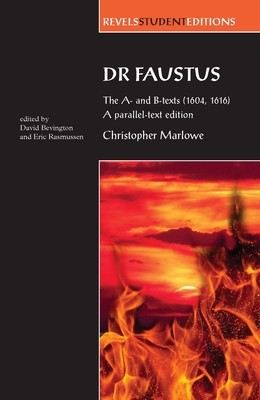
- We will send in 10–14 business days.
- Author: David Bevington
- Publisher: Manchester University Press
- Pages: 191
- ISBN-10: 0719081998
- ISBN-13: 9780719081996
- Format: 13 x 19.3 x 1.8 cm, softcover
- Language: English
- SAVE -10% with code: EXTRA
Reviews
Description
Dr Faustus, first published in 1604 long after Christopher Marlowe had died (in 1593) and then published in an expanded version in 1616, has long fascinated readers and scholars alike as one of the great puzzles in Renaissance English drama. Marlowe himself was highly controversial in his own day, and remains so today, as a daringly heterodox writer. The so-called A-text of 1604 is very short, with missing and misplaced scenes. Some passages are clearly not by Marlowe, but by some other dramatist commissioned by the theatre entrepreneur Philip Henslowe to supplement Marlowe's incomparable tragic writing with some comic horseplay. The B-text adds a considerable amount of material from the Faustbook, padding out the story with more raucous comedy to satisfy audience longings for more magical stunts. This edition uniquely presents the two texts in facing pages, making the reader aware of the changing tastes of audiences, the stage history of the play, and of just how intricate
'editing' a play can be.
EXTRA 10 % discount with code: EXTRA
The promotion ends in 20d.18:43:52
The discount code is valid when purchasing from 10 €. Discounts do not stack.
- Author: David Bevington
- Publisher: Manchester University Press
- Pages: 191
- ISBN-10: 0719081998
- ISBN-13: 9780719081996
- Format: 13 x 19.3 x 1.8 cm, softcover
- Language: English English
Dr Faustus, first published in 1604 long after Christopher Marlowe had died (in 1593) and then published in an expanded version in 1616, has long fascinated readers and scholars alike as one of the great puzzles in Renaissance English drama. Marlowe himself was highly controversial in his own day, and remains so today, as a daringly heterodox writer. The so-called A-text of 1604 is very short, with missing and misplaced scenes. Some passages are clearly not by Marlowe, but by some other dramatist commissioned by the theatre entrepreneur Philip Henslowe to supplement Marlowe's incomparable tragic writing with some comic horseplay. The B-text adds a considerable amount of material from the Faustbook, padding out the story with more raucous comedy to satisfy audience longings for more magical stunts. This edition uniquely presents the two texts in facing pages, making the reader aware of the changing tastes of audiences, the stage history of the play, and of just how intricate
'editing' a play can be.


Reviews